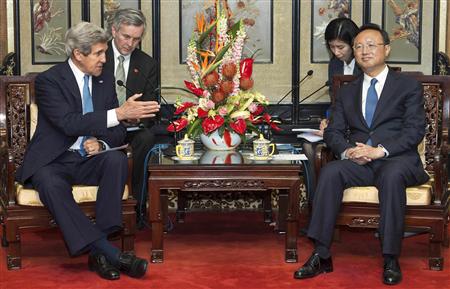
Reuters/Reuters - U.S. Secretary of State John Kerry (L) and Chinese
State Councilor Yang Jiechi deliver remarks at the Diaoyutai State
Guesthouse in Beijing April 13, 2013.
REUTERS/Paul J. Richards/Pool
By Arshad Mohammed
TOKYO (Reuters) - U.S. Secretary of State John Kerry arrived in Japan on Sunday, the last stop on an Asian tour aimed at solidifying support for curbing North Korea's nuclear program and reassuring U.S. allies after weeks of threats of war from Pyongyang.
The North has threatened for weeks to attack the United States and South Korea
since new U.N. sanctions were imposed in response to its latest nuclear
arms test in February. Speculation has mounted of a new missile launch
or nuclear test.
"We must make them (North Korea) recognize that their
provocative actions will not benefit them at all," Kyodo news agency
quoted Japanese Prime Minister Shinzo Abe as saying during a tour on
Sunday of Iwo Jima, the site of a major battle towards the end of World
War Two.
Kerry's talks with
his Japanese counterpart, Fumio Kishida, coincide with preparations for
the North's biggest holiday of the year on Monday, the Day of the Sun,
the birth date of state founder Kim Il-Sung - an occasion for pomp and perhaps a military display.
The North's state media, one of the few ways of
glimpsing what is happening in the reclusive country, have so far
ignored Kerry's talks in Beijing and Seoul.On Sunday, state television showed officials and servicemen applauding speeches extolling Kim Il-Sung in a vast hall, a giant portrait of the state founder hanging from a backdrop.
The KCNA news agency reported at length on floral tributes to the leader who launched the 1950-53 Korean War. But it also rejected as a "cunning trick" South Korean President Park Geun-hye's suggestion last week of holding talks with the North.
"If South Korea truly does have a will to have talks, they should rather change their confrontational attitude instead of playing on words," the agency said, quoting the Committee for the Peaceful Reunification of Korea.
North Korea has repeatedly said it has no intention of abandoning its nuclear program.
The South Korean capital, Seoul, displayed the calm it has shown throughout the crisis. Residents strolled in bright sunshine, visiting street bazaars and ancient temples.
On Saturday, Kerry met leaders in China, the North's sole diplomatic and financial benefactor, and said China and the United States were committed to "the denuclearization of the Korean peninsula in a peaceful manner".
During his first stop in South Korea, where the United States has 28,000 troops stationed, Kerry said North Korea, furious at joint U.S.-South Korean military drills, would be making a "huge mistake" if it were to launch a missile during the current stand-off.
He also said China was in a position to influence the North's policy and had to put "some teeth" into efforts to persuade Pyongyang to alter its policies.
Japan,
separated from North Korea by less than 1,000 km (625 miles) of water
and a frequent target of its anger, is well within range of North
Korea's medium-range missiles.
No comments:
Post a Comment